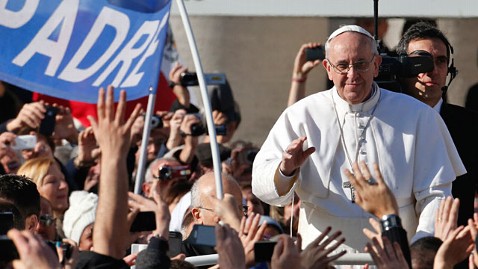Pope Francis Supported Civil Unions as Cardinal

(Image Credit: Michael Sohn/AP Photo)
When Argentina was on the verge of legalizing gay marriage in 2010, Pope Francis - then Cardinal Jorge Mario Bergoglio of Buenos Aires - suggested the church support civil unions, according to news reports published at the time.
"We don't have a fanatic vision," his spokesman, Federico Wals, told Argentina's Infonews in 2010. "What we are asking is that the laws are respected. We believe that we must propose more comprehensive civil union rights than currently exist, but no gay marriage."
Faced with the likelihood that gay marriage would be legalized, Bergoglio, then head of the Argentina Bishop's Conference, suggested during a meeting with bishops in 2010 that the church support civil unions in the country. The idea was rebuked by the bishops, Pope Francis' authorized biographer, Sergio Rubin, told the Associated Press.
PHOTOS: Pope Francis Through the Years
With civil unions, which were already legal in parts of Argentina, off the table, Bergoglio became the public face of the battle against the proposed gay marriage legislation proposed by President Cristina Fernandez de Kirchner.
In Argentina, where three-quarters of the country is Catholic but only 19 percent said they regularly attended Mass, according to a 2010 Pew study, Bergoglio encouraged the faithful to protest the legislation, which needed parliamentary approval.
In a letter asking for prayer from Argentine monasteries, Bergoglio called same sex marriage "an attempt to destroy God's plan" and likened gay adoption to a form of discrimination against children.
Despite his efforts, the law passed in July 2010, making Argentina the first country in South America to recognize same-sex marriage equality.
Kirchner, who has been a progressive force in the country and once called Pope Francis' views "medieval," met privately with the new pontiff Monday at the Vatican. The two had previously clashed on measures such as mandatory sex education in schools, free distribution of contraceptives in public hospitals and the right for transsexuals to officially change their identities.
But all tensions were put aside, at least temporarily.
"I saw him serene, confident, at peace, calm and also busy and concerned, not just about the enormous task that will be governing the Vatican State, but also about the commitment to changing the things he knows must change," she said at a news conference after the meeting.